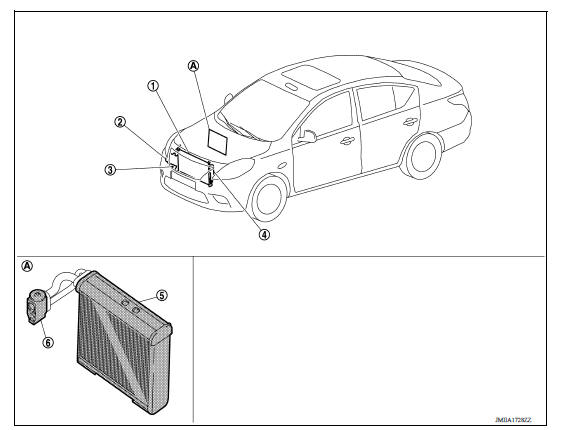Nissan Versa (N17): Component parts
Component Parts Location

1. Condenser 2. Compressor 3. Refrigerant pressure sensor 4. Liquid tank 5. Evaporator 6. Expansion valve A. Built-in heater & cooling unit assembly
Component Description
| Component | Description |
| Evaporator | The mist form liquid refrigerant transforms to gas by evaporation by the air conveyed from blower motor. The air is cooled by the heat by evaporation. |
| Condenser | Cools refrigerant discharged from compressor, and transforms it to liquid refrigerant. |
| Compressor | Intakes, compresses, and discharges refrigerant, to circulate refrigerant inside the refrigerant cycle. |
| Refrigerant pressure sensor | Refer to HA "Removal and Installation". |
| Liquid tank | Eliminates foreign matter in refrigerant, and temporarily stores liquid refrigerant. |
| Expansion valve | Transforms high-pressure liquid refrigerant to mist form low-pressure liquid refrigerant by drawing function. |
 Preparation
Preparation
Special Service Tool The actual shape of Kent-Moore tools may differ from those of special service tools illustrated here. HFC-134a (R-134a) Service Tool and Equipment Do not mix HFC-134a (R- ...
Refrigeration system
Refrigerant Cycle REFRIGERANT FLOW The refrigerant flows in the standard pattern, that is, through the compressor, the condenser with liquid tank, through the evaporator, and back to the compress ...
Other materials:
P1148 closed loop control
DTC Logic
DTC DETECTION LOGIC
NOTE:
DTC P1148 is displayed with DTC for A/F sensor 1.
When the DTC is detected, perform the trouble diagnosis of DTC corresponding to
A/F sensor 1.
DTC No.
Trouble diagnosis
(Trouble diagnosis content)
DTC detecting condition
Possible cause ...
Tire pressure monitoring system
TIRE PRESSURE MONITORING SYSTEM : System Diagram
TIRE PRESSURE MONITORING SYSTEM : System
Description
The BCM has pressure judgment and trouble diagnosis functions. When the
BCM detects low inflation pressure
or another unusual symptom, the low tire pressure warning lamp in the
c ...
Categories
- Manuals Home
- Nissan Versa Owners Manual
- Nissan Versa Service Manual
- Video Guides
- Questions & Answers
- External Resources
- Latest Updates
- Most Popular
- Sitemap
- Search the site
- Privacy Policy
- Contact Us
0.0066
